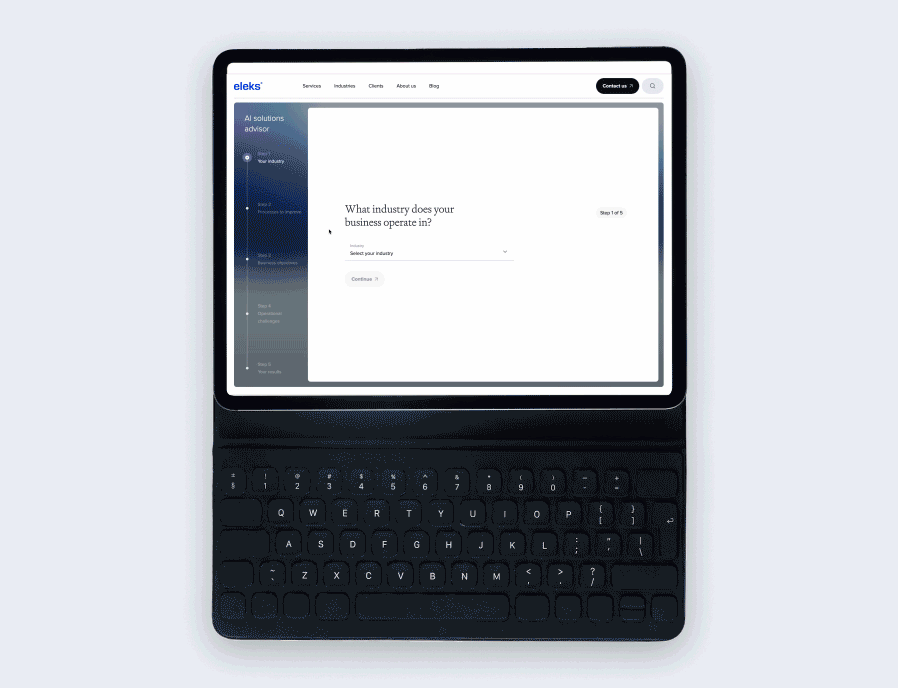
Clinical trials stand at the forefront of medical advancement, offering hope for new treatments and cures. However, the path from concept to approved therapy is filled with challenges that have long troubled researchers and pharmaceutical companies. The landscape of clinical trials is marked by several key issues, including patient recruitment and retention, high costs, managing large volumes of data and the ever-changing landscape of healthcare regulatory requirements.
Emerging technologies, particularly AI solutions, are proving to be beneficial in addressing clinical trial challenges. AI can help save costs, for example, by optimising trial designs and predicting outcomes, it can help reduce the number of participants and shorten trial durations, which in turn not only reduces costs but also speeds up the research process.
AI is highly effective at managing large sets of data using machine learning algorithms, allowing for faster data analysis compared to traditional methods. AI can find patterns and important details that humans might not see. Moreover, AI-powered tools like GitHub Copilot can help researchers write computer code more easily. This means they can spend more time understanding what the data means instead of just writing the code.
AI also contributes to regulatory compliance by monitoring regulatory changes in real-time and assisting research teams in complying with current guidelines. AI-powered systems can also generate regulatory documents, streamlining what has traditionally been a time-consuming process. Now, let’s take a closer look at how AI can help address two of the most significant challenges in the research process—patient recruitment and retention in clinical trials.

AI-powered patient recruitment
The patient databases that need to be analysed before the clinical trial starts can be compared to haystacks containing relevant and irrelevant information. With the help of AI, such haystacks can be turned into well-organised "filing cabinets." Let's dive into how AI is transforming clinical trial enrolment and why it's a win-win for both researchers and patients.
- Dealing with unstructured data. Advanced NLP algorithms don't just scan for keywords; they understand context, meaning they can identify eligible patients from unstructured physician notes and other text-based records.
- Intelligent EHR screening. AI algorithms can look through millions of electronic health records in record time, identifying potential trial participants with unprecedented accuracy. This process, which usually takes humans weeks or months, can now be completed by AI in a matter of hours or days.
- Simplifying medical jargon. AI can simplify complex medical jargon and trial protocols into more understandable language for potential participants. As a result, it's easier for people to understand what they're signing up for, reducing barriers to entry.
- Predictive modelling for enrolment. By analysing historical data, AI models can predict which patients are most likely to enroll and complete a trial. Additionally, from past trials, AI can pinpoint factors that make a trial successful in terms of recruitment and completion.
AI-driven patient retention
Personalised engagement
AI-powered chatbots help to keep participants engaged, offering round-the-clock support to participants. These chatbots can create a more personalised and supportive experience for each participant by
- answering questions,
- sending reminders,
- delivering encouragement and motivational messages.
Moreover, AI chatbots can communicate in multiple languages, automatically adapting to a participant's language preference. This can be particularly valuable during global trials, ensuring clear communication regardless of linguistic barriers.
Early identification of dropout risks
By analysing different data points, such as adherence to medication schedule, frequency and nature of reported side effects, and scheduled appointment attendance, predictive analytics powered by AI can flag at-risk patients. This early warning system allows researchers to intervene proactively, addressing concerns or issues before they lead to dropout.
Remote monitoring
AI-embedded wearables and sensors collect real-time patient data, providing researchers with a more comprehensive and continuous picture of each participant's health status. What's more important for patient retention is that by enabling remote data collection, AI-powered monitoring significantly reduces the need for frequent in-person visits, making trial participation more convenient and less disruptive to participants' daily lives.

Challenges of using AI in clinical trials and strategies to overcome them
While the potential of AI in clinical trials is enormous, it also presents several challenges. It is crucial for researchers and healthcare professionals to understand these hurdles in order to address them and effectively implement AI solutions.
- Data quality: inconsistent or biased data can lead to unreliable outcomes, raising concerns about the accuracy and fairness of AI-driven decisions. Implement rigorous data validation processes and diverse, representative datasets to deal with it.
- Interpretability: AI models can sometimes produce uncertain or hard-to-interpret results, which can be problematic in a field where transparency and explainability are crucial. To address this, develop explainable AI models and provide clear documentation of AI decision-making processes.
- Model degradation: over time, the performance of AI models may degrade, especially in dynamic environments where new data is continuously introduced. This necessitates ongoing monitoring and updates to ensure continued reliability. Implement continuous monitoring systems and regular model updates to maintain accuracy.
- Data privacy and security: collection and storage of vast amounts of patient data by AI raises concerns of increased risk of data breaches. To safeguard information, employ robust encryption, secure data storage, and strict access controls. Ensure compliance with regulations like HIPAA and GDPR. It can be achieved with the use of LLMOps to ensure models meet strict audit and security requirements.
- Excessive reliance on technology: the dependence on AI might reduce healthcare professionals' ability to make critical decisions independently. To prevent this, emphasize AI as a supportive tool, not a replacement for human expertise. Provide ongoing training to maintain and enhance clinical skills.
Key takeaways
The integration of AI in clinical trials represents a significant leap forward in medical research. By addressing critical challenges such as patient recruitment, data management, and regulatory compliance, AI is streamlining the research process and improving its overall quality and efficiency. AI’s ability to personalise patient engagement, predict outcomes, and manage vast amounts of data is revamping how clinical trials are conducted.
However, as we embrace these technological advancements, it's crucial to remain mindful of their challenges, particularly regarding data quality, interpretability, and privacy. By proactively addressing these concerns and continuously refining AI applications, we can harness the full potential of this technology to accelerate medical discoveries, reduce costs, and ultimately improve patient outcomes. As AI continues to evolve, its role in clinical trials will undoubtedly expand, promising a future where medical research is more efficient, accurate, and patient-centered than ever.

FAQs
AI is revolutionising clinical trials by streamlining patient recruitment, enhancing patient retention, processing large datasets faster, optimising trial design, and assisting with regulatory compliance.
Generative AI is increasingly used in clinical trials to simplify medical terminology and trial protocols, aid in regulatory processes, and assist researchers in writing computer code.
In medical research, AI can be used for data analysis, predictive modelling, literature reviews, drug discovery, and medical imaging research.
The use of AI in clinical trials raises ethical concerns regarding data privacy, bias in AI models, lack of transparency, over-reliance on technology, and ensuring informed consent. Addressing these issues requires robust data protection, diverse datasets, explainable AI models, and a careful balance between AI assistance and human expertise.
Related Insights








The breadth of knowledge and understanding that ELEKS has within its walls allows us to leverage that expertise to make superior deliverables for our customers. When you work with ELEKS, you are working with the top 1% of the aptitude and engineering excellence of the whole country.

Right from the start, we really liked ELEKS’ commitment and engagement. They came to us with their best people to try to understand our context, our business idea, and developed the first prototype with us. They were very professional and very customer oriented. I think, without ELEKS it probably would not have been possible to have such a successful product in such a short period of time.

ELEKS has been involved in the development of a number of our consumer-facing websites and mobile applications that allow our customers to easily track their shipments, get the information they need as well as stay in touch with us. We’ve appreciated the level of ELEKS’ expertise, responsiveness and attention to details.

